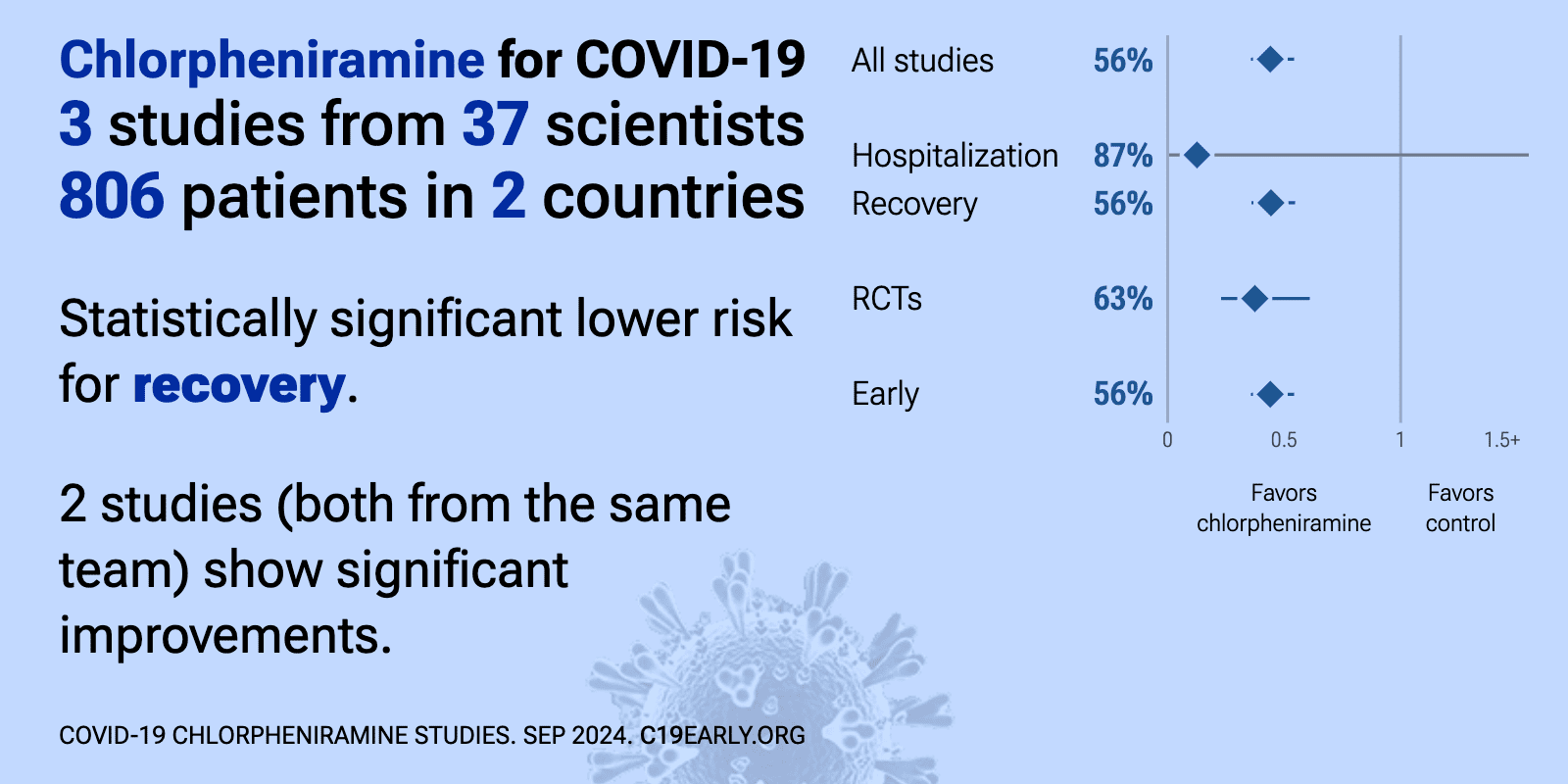
Recent:Ricke.
Feb 21 |
Chlorpheniramine reduces COVID-19 risk: real-time meta-analysis of 3 studies | |
| Significantly lower risk is seen for recovery. 2 studies (both from the same team/sponsor) show significant benefit. Meta-analysis using the most serious outcome reported shows 56% [46‑64%] lower risk. Results are similar for R.. | ||
Feb 4 |
, D., Innovative Medicines & Omics, doi:10.36922/IMO025440058 | Mast cells and histamine receptor-targeted adjunctive treatments for COVID-19: A literature review |
| Review of clinical studies on antihistamines, mast cell stabilizers, and leukotriene receptor antagonists for COVID-19 treatment. Author finds that several mast cell-targeting agents show clinical benefits, with quercetin emerging as one .. | ||
Apr 21 2025 |
et al., Cureus, doi:10.7759/cureus.82736 | Intranasal Chlorpheniramine for Early Symptomatic Treatment of COVID-19 and the Impact on Long-COVID |
| Review of intranasal chlorpheniramine maleate (iCPM) as a therapy for COVID-19 and long COVID. Authors explore how iCPM combines antihistamine activity via H1 receptor antagonism with bitter taste receptor (T2R) activation to address both.. | ||
Nov 26 2024 |
et al., BMC Infectious Diseases, doi:10.1186/s12879-024-10211-8 | Mitigating the risks of post-acute sequelae of SARS-CoV-2 infection (PASC) with intranasal chlorpheniramine: perspectives from the ACCROS studies |
| 90% lower long COVID (p=0.001). Prospective study of 259 COVID-19 outpatients from the ACROSS-I and ACROSS-III RCTs showing significantly lower long COVID with intranasal chlorpheniramine (iCPM) compared to placebo. 72% of placebo patients experienced at least one PASC .. | ||
Aug 29 2023 |
et al., Cureus, doi:10.7759/cureus.92375 (date from preprint) | Chlorpheniramine Maleate Displaying Multiple Modes of Antiviral Action Against SARS-CoV-2: An Initial Mechanistic Study |
| In vitro and in silico study showing that chlorpheniramine maleate (CPM) inhibits SARS-CoV-2 infection by affecting viral adsorption, replication, and having a direct virucidal effect in Vero E6 cells. Molecular docking analysis revealed .. | ||
Dec 31 2022 |
et al., Medical Research Archives, doi:10.18103/mra.v10i3.2752 | Intranasal Chlorpheniramine Maleate for the treatment of COVID-19: Translational and Clinical Evidence |
| 87% lower hospitalization (p=0.08). Small RCT showing significantly improved recovery with intranasal chlorpheniramine maleate. Authors also perform an in vitro study showing efficacy with a highly differentiated three-dimensional model of normal, human-derived tracheal/bro.. | ||
Oct 18 2022 |
et al., Research Square, doi:10.21203/rs.3.rs-2167465/v1 | Chlorpheniramine Intranasal Spray to Accelerate COVID-19 Clinical Recovery in an Outpatient Setting: The ACCROS Trials |
| 54% faster recovery (p<0.0001). RCT and retrospective study of chlorpheniramine nasal spray for COVID-19. The retrospective study included 660 outpatients showing fewer days with general COVID-19 symptoms, cough, anosmia, and ageusia compared to standard of care alone. .. | ||
Oct 18 2022 |
et al., Research Square, doi:10.21203/rs.3.rs-2167465/v1 | Chlorpheniramine Intranasal Spray to Accelerate COVID-19 Clinical Recovery in an Outpatient Setting: The ACCROS Trials |
| 61% improved recovery (p=0.0002) and 74% lower long COVID (p=0.001). RCT and retrospective study of chlorpheniramine nasal spray for COVID-19. The RCT included 101 outpatients showing significantly faster recovery with treatment. The retrospective study results are listed separately [Valerio-Pascua]. Long .. | ||
Jan 28 2022 |
et al., Frontiers in Drug Delivery, doi:10.3389/fddev.2023.1164671 (date from preprint) | On a model-based approach to improve intranasal spray targeting for respiratory viral infections |
| Computational fluid dynamics study of nasal spray administration in 2 subjects showing 100x improvement in nasopharyngeal drug delivery using a new spray placement protocol. The study also found the optimal droplet size range for nasophar.. | ||